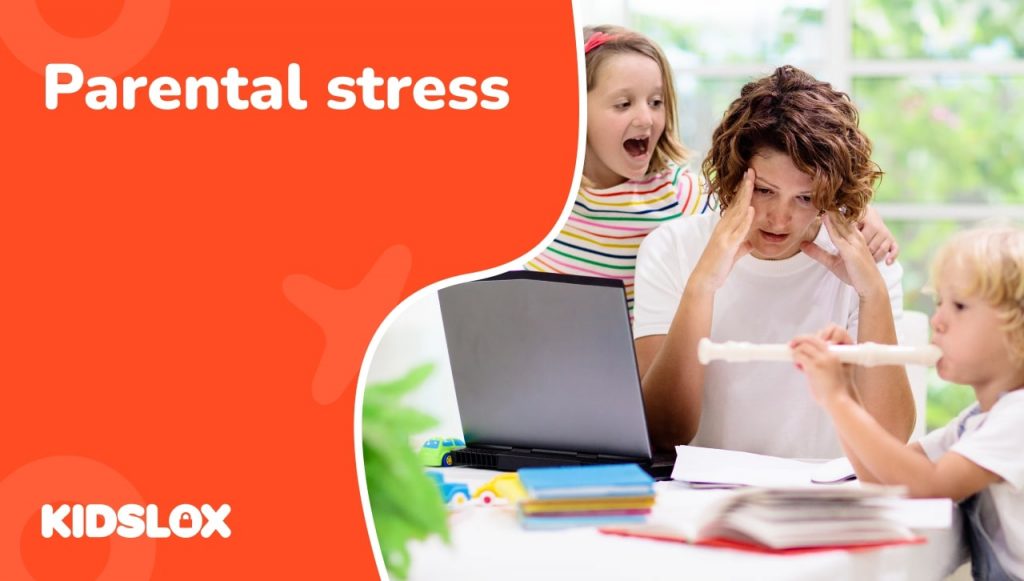Understanding parental stress and what to do when it all gets too much.
Modern parenting is akin to a continuous journey on ever-shifting sands. The advent of technology, for instance, presents both advantages and challenges. On one hand, it offers educational tools and instant communication, but on the other, it raises concerns about screen time, cyberbullying, and privacy. Additionally, the societal push towards achievement often places immense pressure on both parents and children, making it difficult to strike a balance between aspirations and well-being. The expectations to be constantly engaged, nurturing, and present while also managing work, self-care, and societal roles can be overwhelming. Yet, amidst these trials, the essence of parenting remains: to love, guide, and provide for our children to the best of our ability.
The Many Types of Parenting Stress
Parenting has always been about highs and lows. The stress we talk about today isn’t solely about handling the typical tantrums, navigating peer pressure, playground bullies or overseeing schoolwork. It’s also about making ends meet, ensuring nutritious meals, maintaining a bond with our partner, and carving out a few moments for self-care amidst the chaos. Instruments like the ‘Parenting stress index’ and ‘Parenting stress scale’ may quantify certain pressures, but the real essence lies in the silent moments of doubt, hope, anxiety, and love that every parent feels.
Today’s world, with its barrage of information and constant connectivity, has an opinion on everything—including how we should raise our children. From the pressure to be the Pinterest-perfect parent to managing unsolicited advice from well-meaning relatives, societal expectations can often amplify our internal dilemmas. Finding our authentic voice and trusting our instincts while being bombarded with a barrage of do’s and don’ts is no easy feat.
Amidst the hustle of daily routines, ensuring our children’s emotional well-being can be challenging. We wear many hats—therapist, cheerleader, mentor—and hope that we’re making the right decisions. Physical health is equally paramount, with sports, extracurriculars, and general fitness playing crucial roles. And while we focus on our children, we mustn’t forget our well-being. After all, a stressed parent often means a stressed household.
Understanding the Impact: Parental Stress and Family Dynamics
The ripples of our stress don’t stop at our own shores—they touch our entire family. Children, with their intuitive natures, can sense and internalize parental anxiety, adding extra pressure to parents’ desire to put their best foot forward at all times. This cycle of transmitted stress can inadvertently shape the emotional and cognitive landscape of a child. Recognizing the ‘effects of parental stress on child development’ helps in preemptively addressing potential issues. Additionally, open communication is vital; creating a space where feelings and concerns are shared fosters understanding. It’s not about shielding our children from every adversity but equipping them with the tools to navigate them and fostering resilience.
The Digital Dilemma: Screen Time and Technology
Something our own parents didn’t have to contend with is the strain of digital parenting. Today’s kids were born in the era of the smartphone, and they don’t know a world without it. While technology has brought us so much progress, it also brings its share of concerns. Deciphering the right amount of screen time, discerning age-appropriate content, and ensuring our children’s safety in a virtual playground can be overwhelming. The device that connects our kids to a world of knowledge also opens doors to potential pitfalls: cyberbullying, misinformation, and the mental effects of social media comparison. It’s a delicate balance, acknowledging the benefits of technology while also setting healthy boundaries.
10 Simple Strategies To Reduce Parental Stress
We can’t hand-deliver a babysitter, or give you a pep talk at that critical moment when your toddler is having a meltdown on the middle of the freeway, but we hope these simple strategies help the next time you feel the pressure.
1. Open Communication: Foster an environment where everyone in the family feels comfortable expressing their feelings, and teach children early to recognise their own emotions. Regular family chats can make a significant difference, and leaving the floor open for teens to come to you with any issues is a great way to build the trust that’s needed for harmony. Be clear and open with your partner when you feel like things are getting too much. Sharing the burden and taking the heat off one another when you’re feeling stressed can make a significant difference to your mental health and coping mechanisms.
2. Seek a Support System: Outside of your partner, build a community of people who you can lean on for support. This can include friends, other family members and support groups. It can be particularly challenging and stressful for parents who have children with additional needs, so finding a group that understands those unique circumstances and have lived with them, can offer an enormous amount of comfort. Sharing experiences and gaining perspectives can offer relief and introduce you to new coping strategies.
3. Set Realistic Expectations: Perfection in parenting is a myth. In today’s Instagram age it can feel like everyone’s children are well-behaved, without challenges and that parenting is a breeze, but that’s simply not the truth. Sharenting has become a phenomena born from social media, and it can have a detrimental effect on parents’ mental health when they compare their experiences to a highly curated version of family life online. It may seem like other moms and dads are constantly doing things and buying things for their children. Focus on your own home, no one knows what’s best for your family but you. Understand that it’s okay to have off days. Focus on the bigger picture and celebrate small victories.
4. Mindful Moments: It is so hard with the demands of family life to take any time for yourself, but when you can, introduce mindfulness or meditation into your routine. Spending just a couple of minutes a day concentrating on one thing that you’re grateful for can help keep you in a positive mindset to manage your stress. These practices can anchor you, reducing anxiety and providing clarity to your day.
5. Limit Over-scheduling: There is a real pressure on parents to cram something into every single moment of children’s lives. Hobbies, lessons, schoolwork, birthday parties, it’s a lot! While extracurricular activities are beneficial, overloading schedules can increase stress. Ensure there’s downtime for both you and your child and feel empowered to say No when something feels too much.
6. Stay Informed, Not Overwhelmed: While it’s essential to be informed, especially in the digital age, set limits. Avoid the rabbit hole of endless online parenting forums which can sometimes magnify anxieties. If you feel like the endless onslaught of social media and is getting too much, Kidslox offers an invisible pair of digital hands that can help. Parental controls set time limits, enhance security and give you an insight on what your child’s online life looks like.
7. Delegate When Possible: If you have a partner or support system, share responsibilities. Sometimes, taking a break or splitting tasks can provide much-needed relief.
8. Prioritize Self-care: It’s not selfish; it’s essential. Whether it’s a hobby, exercise, or just quiet reading time, taking moments for oneself can rejuvenate the mind and spirit. You’ve probably heard the cup full analogy before, but when it comes to parenting, it’s essential to understand that if you are running on empty, it’s impossible for you to give your best to the people who need you the most.
9. Stay Healthy: When the stress of parenting gets too much, it’s all too tempting to relax with a glass of wine when the kids are in bed, or veg out on the couch in exhaustion. But joining a class, or even going for a nightly walk, can help blow off the cobwebs and keep you healthy. A healthy body and mind will support you through the stress of parenting.
10. Routine and Structure: While life throws curveballs, a semblance of routine can provide a comforting rhythm to both parents and children. Kids thrive on routine, and it keeps you calm when you know what’s happening and you’re prepared. Getting everything ready for the morning (an especially stressful time in my house!) the night before is one simple practice that can alleviate some of the stress of the daily grind.
Stress, in its varying degrees, is an inevitable part of the parenting journey. But with the right strategies, its impact can be mitigated.
Seeking Support: The Power of Community
In our journey of parenthood, we aren’t alone, even if it sometimes feels that way. There’s immense power in community—whether it’s friends, fellow parents, family, or professionals. It’s not just about venting (although that’s therapeutic too); it’s about shared experiences, wisdom, and sometimes, innovative solutions to common problems. Joining a parenting group, attending workshops, or simply scheduling regular catch-ups with trusted friends can be a game-changer. Remember, seeking support isn’t a sign of weakness—it’s a testament to our commitment to being the best parents we can be.
In an age of information overload, it’s easy to get lost in a sea of parenting advice, metrics, and comparisons. However, success doesn’t lie in the number of extracurriculars your child is enrolled in or how organic your meals are. It’s in the laughter, the shared moments, the resilience built during tough times, and the knowledge that you’re doing your best. Don’t let anyone judge you, you know what’s right for your family and best for you.
The Role of Professional Support
There’s no shame in seeking external help when needed. Professionals, be it counselors, therapists, or parenting coaches, can offer guidance, strategies, and coping mechanisms tailored to individual family needs. They’re not a sign of failure but rather an avenue for growth and support. Parenting is tough, and it doesn’t come with a manual, so asking for expert advice isn’t wrong or a sign of not coping, it’s a smart and strong thing to do.
This can be especially true for parents of children with additional or complex needs. There certainly is no rulebook and trying to shoulder it all is going to end in tears – likely your own. Accept help when it’s offered, and seek it out when you need it.
The tapestry of parenthood is woven with threads of joy, challenges, learning moments, and pure, unadulterated love. As we navigate this journey, let’s remember to be kind to ourselves, to celebrate the small victories, and to know that even during turbulent times, growth is happening. For in the heart of challenges lies the potential for transformation—for us and young people.





